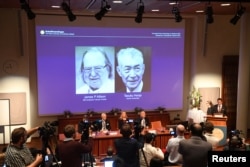Two scientists have won the Nobel Prize in medicine for research leading to new successful cancer treatments.
Nobel officials announced in Sweden Monday American James Allison and Japan’s Tasuku Honjo were winners of the 2018 Nobel Prize in Physiology or Medicine. They will share a $1-million award that comes with the prize.
The two researchers discovered a process that helps a person’s own immune system attack cancer in the body. They have been independently working on the treatment since the 1990s.
The process targets proteins that help control the action of T-cells, which destroy foreign agents in the body. These proteins block the T-cells from attacking the body itself. Cancer cells are not wholly foreign, so they are able to avoid T-cell attack.
The researchers discovered a way to use drugs to block the proteins from stopping T-cells. It permits them to recognize the cancer cells as foreign and attack them.
The discoveries led to greatly improved therapies for skin cancer, as well as cancers of the lung, head, neck, kidney and liver. Such cancers can be hard to treat, and therapies such as chemotherapy and radiation can do damage as well as good.
Revolutionary cancer treatment
The new treatments represented “a landmark in our fight against cancer,” the Nobel Assembly at Sweden’s Karolinska Institute said in announcing the winners. It said Allison and Honjo's work “revolutionized cancer treatment and has fundamentally changed the way we view how cancer can be managed."
Jedd Wolchok is the chief of melanoma and immunotherapy at Memorial Sloan Kettering Cancer Center in New York. He spoke to the Associated Press. In his words, “an untold number of lives... have been saved by the science” the two men discovered and developed.
Tasuku Honjo, a professor at Japan’s Kyoto University, said winning the prize was “a great honor.” He told the Nobel organization in a telephone interview Monday he was “very pleased to hear what I have done is really meaningful.”
Honjo said he hopes to keep working on the research in an effort to save more cancer patients.
James Allison released a statement through the University of Texas’ M.D. Anderson Cancer Center in Houston, where he is a professor. “I’m honored and humbled to receive this prestigious recognition.
“I was doing basic science to do basic science, but you know, I had the good opportunity to see it develop into something that actually does people good,” Allison said. “That's gratifying.”
Other prizes
Nobel officials will announce the physics prize on Tuesday. On Wednesday, they will announce the chemistry prize. And the Nobel Peace Prize will be named on Friday.
Also in Stockholm Monday, the husband of former Swedish Academy member Katarina Frostenson was found guilty of a rape in 2011. A court sentenced Jean-Claude Arnault to a two-year prison term.
Seventeen other women also have accused him of rape or sexual assault.
The case caused a crisis in the Swedish Academy. Several Academy members resigned after officials permitted Frostenson, a poet, to remain in her position. Later, she left the Academy also.
The Swedish Academy canceled this year’s literature prize as a result of the crisis.
I’m Caty Weaver.
Bryan Lynn wrote this story for VOA Learning English, based on reports from the Associated Press, Reuters and Agence France-Presse. Caty Weaver was the editor.
We want to hear from you. Write to us in the Comments section, and visit our Facebook page.
____________________________________________________________
Words in This Story
immune system – n. the cells and tissues in the body that fight against infection
therapy – n. the work of treating illness
landmark – adj. event seen as famous or important in the history of something
fundamentally – adv. relating to the most important or main part of something
humble – v. having or showing a modest or low estimate of one’s own importance
prestigious – adj. respected and admired
opportunity – n. situation in which it is possible for a person to do something
gratifying – adj. giving pleasure or satisfaction









